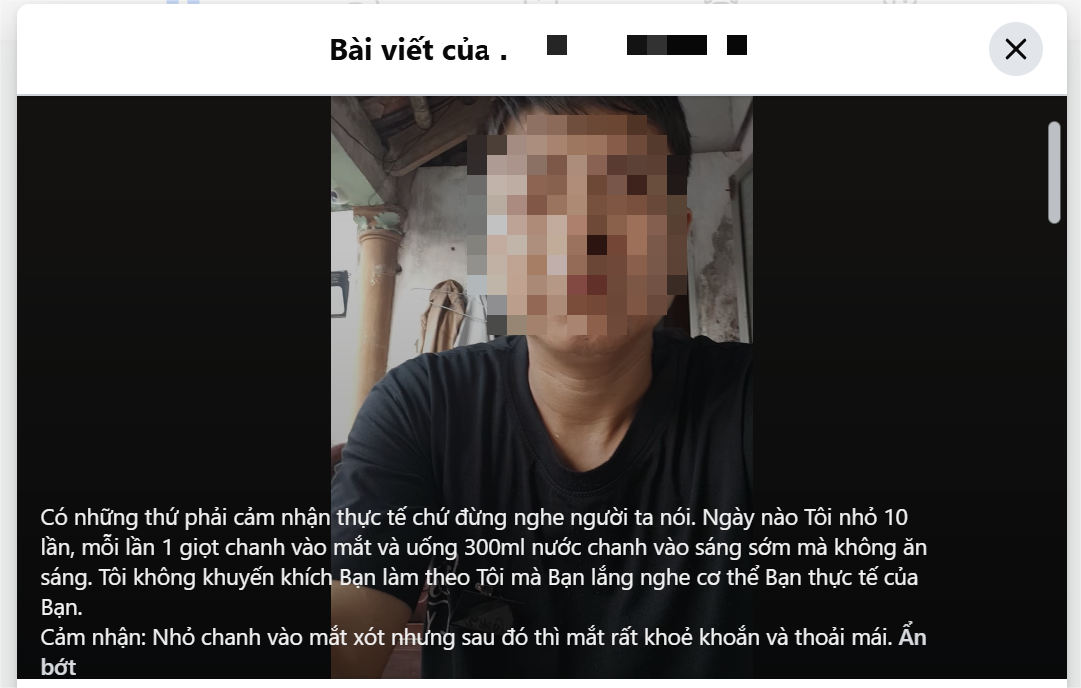The cornea is one of the most sensitive tissues in the body. Using acidic substances such as lemon juice in the eyes is extremely dangerous and can cause permanent vision loss or even blindness.

In the past few days, on some social media platforms, a strange and dangerous trend has appeared: dropping lemon juice into the eyes to brighten the eyes, improve vision, and clean the eyes naturally...
Although this trend attracts the attention of young people and is spread as a personal experiment, this action is not only completely unscientific but also seriously threatens the health of the eyes.
Is lemon juice good for eyes?
Lemon is a nutritious fruit, known for its high vitamin C (ascorbic acid) content, along with organic acids, especially citric acid, accounting for 5 - 7%, flavonoids and some essential oils such as limonene. These are all strong acidic compounds, with mild antibacterial properties, useful when used properly in food or dermatological care.
However, the physiological environment inside the eye is completely different. The surface of the eye (cornea, conjunctiva) has a neutral pH (about 7.4) and is protected by a thin layer of tears containing proteins, salts and enzymes to maintain balance and prevent infection. Putting a strong acidic liquid like lemon juice into the eye will disrupt this balance, causing irritation and serious damage.

Consequences of putting lemon juice in the eyes
Putting lemon juice directly into the eyes can cause many acute and long-term consequences:
- Causes severe irritation and burning pain: Because lemon juice has a low pH (about 2 - 3), when in contact with the cornea it will cause a burning sensation, red eyes, continuous tearing and eyelid spasms.
- Causes inflammation and damage to the cornea: If irritation persists, it can lead to conjunctivitis or more seriously, keratitis, causing temporary or permanent blurred vision if not treated promptly.
- Increased risk of eye infection: Exposure to citric acid in lemon juice and loss of the natural protective layer of the eye increases the risk of bacterial and fungal infections. In addition, fresh lemon juice is not a sterile solution. It may contain bacteria or fungi from the surface of the lemon peel, the squeezing tool or from the environment. When introduced into the eye, these microorganisms can easily penetrate, especially when the eye membrane has been damaged by acid, increasing the risk of purulent inflammation, abscess or corneal ulcer.
- Long-term effects on vision: If eye damage is not treated properly, users may face corneal scarring, causing permanent vision loss or even blindness. Severe cases may require a corneal transplant to restore vision.

Doctor's advice
Lemon juice is a healthy drink when used properly. Drinking diluted lemon juice can help supplement vitamin C, increase resistance, aid digestion and mild detoxification. However, lemon juice should never be used to drop into the eyes or apply to the skin around the eyes.
The cornea is one of the most sensitive tissues in the body. Using acidic substances such as lemon juice is extremely dangerous. Any use of foreign substances in the eye without a doctor's prescription carries the risk of losing vision.
In traditional medicine, protecting the eyes is a top priority with the concept: "The Liver opens the eyes" - meaning the eyes are closely related to the Liver. Bright eyes with clear vision are a sign of full blood and qi, and a full Liver. Therefore, according to traditional medicine, to keep the eyes bright and healthy, it is necessary to:
- Blood tonic and liver tonic: Can use herbs such as wolfberry, astragalus, angelica, cassia seed...
- Calm your mind and reduce stress, one of the causes of tired, dry, blurry eyes...
- Use herbal eye drops as directed, such as chrysanthemum decoction or other clinically tested and properly manufactured herbal products.
There is no medical record of putting lemon juice in the eyes to "brighten the eyes". This is a misconception and misapplication that can lead to people's misunderstanding, leading to unpredictable consequences.
To protect and enhance eye health, instead of following unscientific trends, we should take the following safe and scientific measures:
- Keep eyes clean, avoid putting dirty hands or foreign objects in eyes.
- Wear sunglasses when going out in the sun to protect your eyes from UV rays.
- Supplement nutrients that are good for the eyes such as vitamins A, C, E, lutein and omega-3 from foods (carrots, dark green vegetables, salmon...).
- Do not overuse phones or computers for long periods of time; follow the 20-20-20 rule (every 20 minutes of looking at the screen, look 20 feet away (about 6 meters), for 20 seconds.
- Regular eye exams, especially if there are signs of eye strain, eye pain, blurred vision...
The lemon juice eye drop trend is a classic example of an unverified social media trend that can have serious, sometimes irreversible, consequences for your vision.
Internet users, especially young people, should be alert to the information spread, always verify with reputable sources of information and absolutely do not experiment with anything that can affect their health. Protecting your eyes is protecting the most important "door" leading to the world, do not let a moment of curiosity cause you to regret it for the rest of your life!